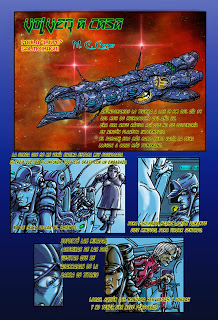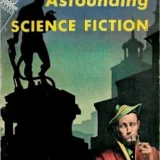Among diehard science fiction fans, there is this argument that happens quite frequently. Someone will mention how in a series, the protagonist used a stargate to jump from one point in the universe, and how they thought it was cool.
Someone in the room with some knowledge of physics then says that this is impossible, and bores everyone with an explanation of the energy necessary to teleport an object. It’s a silly objection though, because even if he had the amount of energy he’s talking about, you will still notice that he doesn’t have the ability to make such a gate. Nobody does, they don’t exist.
This is not what I’m talking about today.
The thing about introducing a power or effect into any storyline, especially a serial, is that it has far ranging impact on the plot of the story. I frequently get the sense that people like to throw out incredible abilities into their story because they mistakenly believe that it will be more impressive that way, and the writer then has to write all kinds of insane twists in the plot to explain how everything works out in the end.
Teleportation is probably the single most common offender. If you were to give me a teleportation device with no practical limitations, then I could assassinate just about any leader in the world. In many ways, it’s actually a more useful device then any weapon ever devised. It’s such an incredibly useful ability then when it’s introduced into a television show, I frequently know exactly what is going to happen to the character who has it.
As a practical example, take Supernatural. I liked the show in the beginning, but it peaked in Season 5. The entire show is filled with characters who can instantly teleport to any point in the cosmos any time they wish. One of those characters is the angel Castiel, and as soon as I realized he could do this, I knew that this character would be beaten, depowered, driven insane, killed, and resurrected with dizzying frequency. Frequently multiple times a season. In the last show of the current season, they depowered him. (Again.) He’s mortal now.
The simple reason is that if he could save the day any time he felt it, he completely ruins the dramatic conflict of the show. It’s too easy, too unsatisfying, and it happens too often. Therefore, the writers were constantly finding terrible things to do to Castiel, to explain why he didn’t just show up every single time they needed something.
In Star Trek, the original show actually introduced transporters because they couldn’t afford a landing craft. (The craft they did show was introduced in season two, after they had some time to allocate money.) This decision has effected the entire franchise, since it means that in every show, every crew of every ship can transport all over the place, and this has enormous tactical ramifications.
One of the things I really disliked about Star Trek: The New Generation (though I did like many things about it) was that the show frequently turned into a gadget of the week exercise. The captain never really did anything, or made any tactical decisions. He told Geordy to invent something, which he did, and it then saved the day. It’s not really clear to me why they put all these people on the ship, since the engineering crew essentially solved all the problems.
The Captain was supposed to be a very impressive man, but he acted more like the ships’ counselor then a Captain. In the early shows, starship combat didn’t even involve much movement from what you could see. They were attacked, and the Captain would bravely say “fire!” You would then see a few beams of light, and the only thing that seemed relevant was who had better technology. Star Trek: The New Generation had some of the worst star combat scenes I’ve ever seen.
Usually of course, when teleportation is introduced there are more practical limits on it. Having a “gate” of some sort avoids a lot of this, because it goes only from one point to another point. You still have to approach the gate without getting ambushed, which from the standpoint of a writer trying to build tension, is a good thing.
When you argue about whether or not an ability should exist, it isn’t just about realism. It’s about how those abilities will effect the story. You will have to alter the plot depending on how many god abilities you give out to your characters. I think that there’s a kid inside most of us who thinks that making godlike technology accessible to the characters will make the story more fun. That might be true, if you’re writing a story to appeal to 12-year olds. If you are aiming higher then that, then you should keep in mind that some of the most thrilling fight scenes in history occurred between people using their bare hands.
Part of writing a good character is describing an interesting person with weaknesses and frailties. When describing a future set of technologies for a culture in your world, you should probably think about its weaknesses as well. Once they can disappear off the face of a planet and appear on the deck of a ship in orbit, that culture doesn’t really have any weaknesses left, unless it is fighting another godlike civilization. I don’t really like stories about godlike civilizations fighting each other. I like good tactical simulations, and the crazier the abilities you give to someone, the harder it is to figure out what their battles will look like.
All I’m really suggesting is that you think about the action and theme of your book when you decide what your protagonists can do. If they don’t need to have an incredibly powerful ability for the story to make sense, don’t give it to them.
A science fiction fan in Pueblo, Colorado.










I have to agree with you, Mr. Webb. Introducing amazing powers means you have to have an Amazing counterbalance. The best example of this ever is the 1980s movie “Remo Williams: The Adventure Begins”, based on the long-running Destroyer series of men’s adventure novels by Warren Murphy and Richard Sapir.
Remo Williams is a beat cop framed for murder and trained in the ancient arts of Sinanju- the ultimate martial art and a House of Assassins going back thousands of years. In the books, Remo becomes superhuman- able to dodge bullets, scale vertical walls and punch through steel. He’s pretty amazing.
In the movie, we see him learning these abilities… all so he can fight… wait for it… a corrupt politician. The politician doesn’t have any superpowers. No robot army or ninja followers. His one Evil Minion is a guy with a diamond in his tooth. For show, not to increase his bighting prowess.
LAME.
Yes, super-heroes need super villains, super powers should have super consequences.
Points very well made, Michael. Every writer should take this on board. Especially those who (my pet peeve) introduce godlike abilities and then *ignore* the ramifications. My favorite example is stories with time travel wherein the time traveller never even thinks about making a killing on the stock market / the ponies / the football pools.
It’s The [Next] Generation, and you’re absolutely wrong about it. Picard made lots of tactical and strategic decisions. Also, comparing him to a ship’s counselor was about as far from the character as you could get. While he occasionally tried to talk to his crew, it took coaxing, usually from Beverly or Deanna, for him to open up slightly to anyone who wasn’t Riker. And he found the crew’s personal matters very uncomfortable to discuss, avoiding it as much as possible.
All TV and movies suffer from stage origins. That is, they think that we, the audience, want to sit around and watch people talk. Talk is literally cheap, and many writers think they are clever for coming up with dialogue.
Action is far better- and despite how good ST:TNG was, it was still a talkapalooza.
It’s true that he was described as hating having those conversation, but he did have them. Frankly, he had those sort of conversations far too often. In a similar military atmosphere, fi the Captain were even aware of as many personal problems as he was, the Captain of a real ship would feel that something was seriously wrong.
And I don’t feel like he made hardly any tactical decisions, not as I know them. In fact, maneuvering was virtually irrelevant until you get to the later movies, which handled things much better.